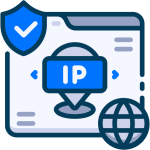
An IP Address (Internet Protocol Address) is a unique numerical identifier assigned to every device connected to the internet. It serves as a means of communication between devices, allowing them to send and receive data packets. The IP address is essential in enabling the transfer of data from one device to another over the internet.
Structure of IP Address
An IP address is a 32-bit binary number that is divided into four 8-bit octets or segments. Each octet is separated by a period. For example, an IP address might look like this: 192.168.1.1. The decimal equivalent of the binary numbers is what is actually used to display the IP address in a human-readable format.
Types of IP Addresses
There are two types of IP addresses: IPv4 and IPv6.
Dynamic and Static IP Addresses
There are two types of IP addresses: dynamic and static.
IP Address Classes
There are five classes of IP addresses, A, B, C, D, and E.
Classes A, B, and C are the most commonly used. Class A addresses are used for large networks, while class B addresses are used for medium-sized networks. Class C addresses are used for smaller networks. Classes D and E are used for multicast and experimental purposes, respectively.
IP Address and Geolocation
An IP address can be used to determine the geographic location of a device. Geolocation can be used for various purposes such as tracking the location of a lost or stolen device, monitoring website traffic, and providing location-based services.
IP Address and Privacy
Because an IP address can be used to identify a device’s location and internet activity, it can also be used to track a user’s online activities. As such, many users are concerned about their privacy when using the internet.
VPN (Virtual Private Network) services and Tor (The Onion Router) are some of the tools available to users who want to protect their privacy by masking their IP address.
Conclusion
In conclusion, an IP address is a unique identifier assigned to devices connected to the internet. It enables the transfer of data between devices and is essential in the functioning of the internet. Understanding the different types of IP addresses, IP address classes, and geolocation is important for anyone interested in internet technology. It is also important to consider privacy concerns when using the internet and take measures to protect oneself when necessary.
